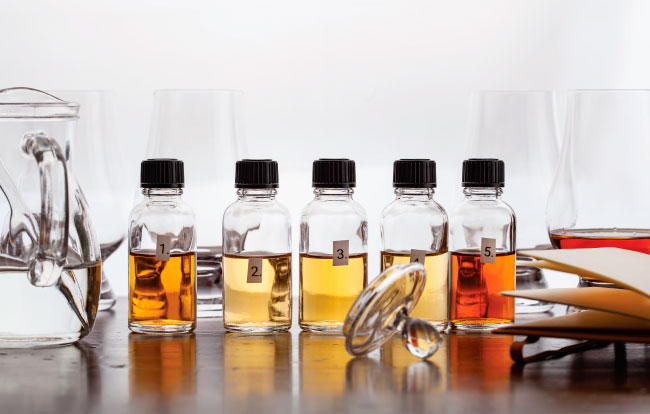Alcohol distillation has long been associated with the production of alcoholic beverages, but its applications extend far beyond intoxication.
This ancient technique has many practical uses on the Homestead. Let’s explore some lesser-known benefits of alcohol distillation, from crafting herbal tinctures to producing fuel and preserving fruit.
6 Ways to Use Alcohol
Herbal Medicines: Tinctures
One of the most celebrated applications of alcohol distillation on the Homestead is producing herbal medicines. Herbal tinctures are solutions in which the active medicinal compounds of medicinal plants are extracted using alcohol.
Distillation ensures these compounds are extracted and concentrated, allowing for potent and long-lasting remedies. From echinacea for immune support to valerian for sleep aid, the versatility of herbal tinctures cannot be understated.
First Aid and Wound Care
Alcohol distillation plays a crucial role in first aid and wound care. High-proof alcohol, such as ethanol, is used as an antiseptic to clean and disinfect wounds, reducing the risk of infection. It is a staple in medical settings and for personal hygiene, providing a reliable way to sanitize minor injuries.
Disinfecting Surfaces
The power of alcohol as a disinfectant extends beyond first aid. It is a practical and versatile disinfecting agent used in laboratories, medical facilities, and homes.
Alcohol’s ability to kill bacteria and viruses makes it an invaluable tool for maintaining a clean and sterile environment.
Fuel Production
As the world seeks alternative and sustainable energy sources, alcohol distillation contributes to the production of biofuels, particularly ethanol. Ethanol, derived from fermented plant materials like corn or sugarcane, can run small motors as a cleaner-burning fuel. It can also help reduce greenhouse gas emissions and dependence on fossil fuels.
Barter and Trade
Alcohol distillation has historical significance in trade, and the Homestead Community is no exception. The trade of distilled spirits, or ethanol, has undoubtedly influenced economies and trade relationships for centuries. These beverages are not just a source of leisure but can also be used to exchange goods amongst the community.
Preserving Fruit by Making Brandy
The art of making brandy, a distilled spirit from fruit, extends the shelf life of seasonal fruits. A potent, long-lasting, and flavorful product is created by distilling fermented fruit mashes and juice, such as peaches or apples, into brandy.
Brandies can be enjoyed as spirits or used in cooking, offering a delicious way to savor the essence of the fruit year-round.
Vanilla Extract
Vanilla extract is a beloved ingredient in baking and cooking. The base for most vanilla extracts is alcohol, typically vodka, which extracts the flavor and aroma from vanilla beans. The result is a versatile and essential flavoring that enhances various dishes, from desserts to savory dishes.
Beyond the drink…
While alcohol distillation is synonymous with beverages, its benefits extend far beyond a simple drink. From the production of herbal tinctures for holistic health to the preservation of fruits as brandy and their essential role in first aid and disinfection, the world of distillation is rich and diverse.
It contributes to health but is also used for trading, bartering, and in ways not often recognized in daily life. As we explore new applications and innovations, the timeless art of alcohol distillation remains an essential part of human culture and progress.








COMMENTS(2)
There are 2800 legal craft distilleries across the nation. Our family has one. No one knows about us because the craft is relatively new; we are 15 years old and the Oldest in AZ. I believe if you build a relationship with your local distillery, it’s a win-win. You will most likely not see the craft in the stores, as the huge corporations have a lockdown on alcohol and control it 99.99%. What little you see from craft in a store, if you see it at all, will most likely be an expensive clone of something you could get at the basic liquor store, as they are also purchasing bulk alcohol and just running it through their still to call it “made at x,y,z distillery”. Yes, it is legal to “re-distill”. We do not. How can you find out? Ask. Q1: “What are you fermenting on site?”. (if they say someone else does that for us – then you know they buy bulk alcohol). Q2; (if they tell you they are 100% distilling their fermentations) “Are you blending with any distillate that you get from outside your facility?”; that will make sure you are getting the good stuff, the stuff that will win medals. I tell you this so your tinctures will be A#1. You don’t just want that corporation-made stuff from Ohio, IL, and Indiana. It’s the lowest common denominator on this totem pole. Those craft distilleries? At least 3 out of 10 are fermenting and distilling. Go out and find them, they will have the best stuff for your tinctures and anything else you want it for. Not all of them will feel comfortable selling high-proof and most of the time it is not done anymore. I’m sure that you know what to do…relationships!
Great to know, thank you!